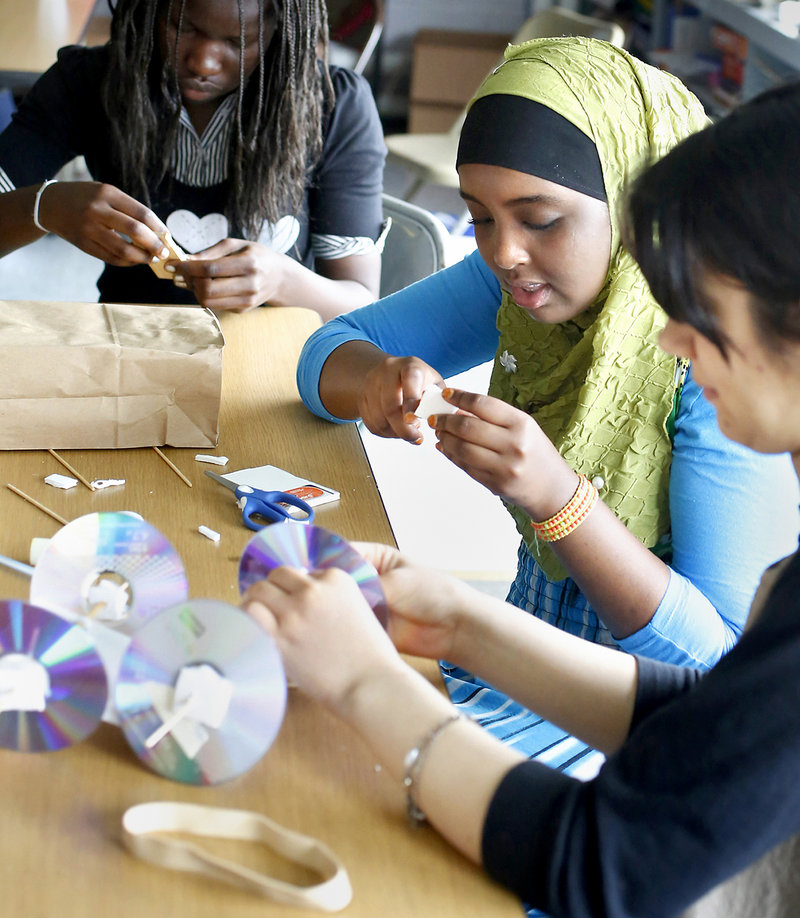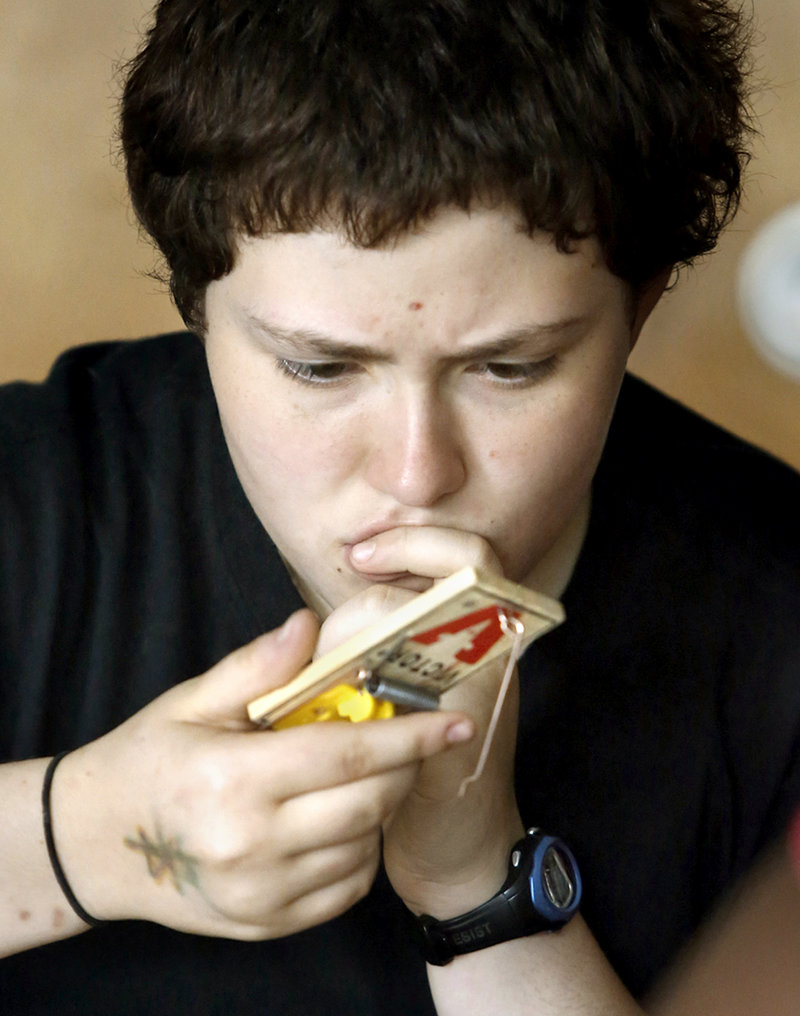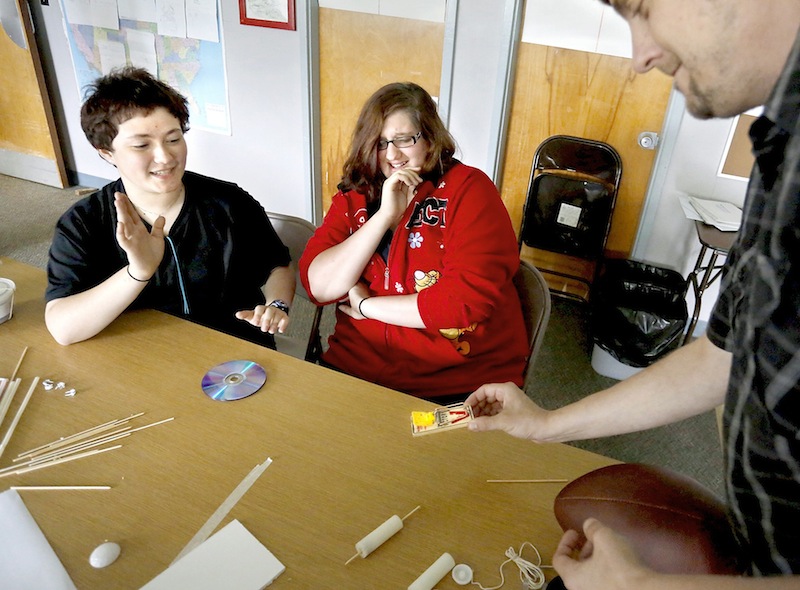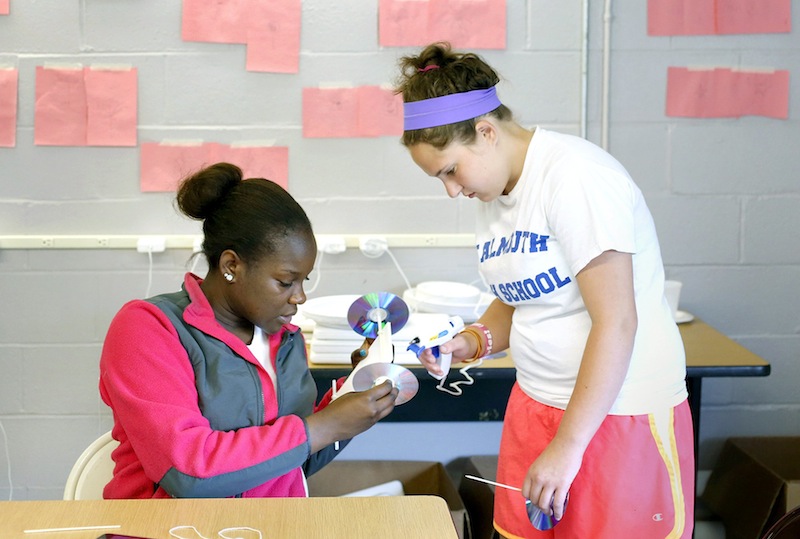MACKWORTH ISLAND – The loud SNAP of the mousetrap made 17-year-old Julia Kaserman scream – as giggles burst out from some of the dozen-plus girls bent over nearby tables.
“I wasn’t expecting that!,” Kaserman said, eyeing the mousetrap that lay among the sticks, straws, string, CDs and rubber bands that the girls eventually would have to put together to create a self-propelled mousetrap car.
At another table, Caitlin Harrison set off her trap on purpose, watching closely. “OK, it flies straight up,” she reported solemnly to her teammates.
Harrison, who’s 16, said she plans to be a biomedical engineer specializing in prosthesis design.
The 16 girls in the room were working in teams on their daily “design challenge,” part of the three-week “Girls Summer STEM Experience” offered for the first time this year at the Regional Education Alternative Learning School, or REAL School, on Mackworth Island in Falmouth.
STEM stands for science, technology, engineering and math. The free program partners high school-age girls with businesses and organizations to solve particular challenges.
For example, one group paired with CPM Construction, which is working on the Martin’s Point Bridge between Falmouth and Portland, to build load-bearing bridges out of balsa wood.
Another group, working with Resilient Roots of South Portland, was experimenting with best practices for vermiculture – raising worms to create nutrient-rich soil.
The Sierra Club team built energy-efficient windows, and the Preble Street team came up with ways for the social-service agency to count how many people it serves.
The four teams will present their projects at a ceremony Thursday night.
“They’re learning, but at the same time, they’re having a great time,” said David West, an AmeriCorps worker. The program also includes leadership exercises, such as completing a ropes course, and daily lunch talks by female leaders in the community.
The program is funded by a $10,000 grant from the Maine Women’s Fund.
“Supporting this is a natural fit for us,” said Sarah Ruef-Lindquist, chief executive officer of the Maine Women’s Fund. The fund gave out $90,000 in grants last year to eight programs that promote economic security for girls and women.
“There’s fairly good data … that girls are not entering science, technology, engineering and math fields at the rate that boys are, and this is an opportunity for them to consider those fields,” said Ruef-Lindquist.
Increasingly, educators and politicians are urging students to go into science, technology, engineering and math fields. The Girl Scouts now offer five STEM badges for scouts to earn.
The REAL School program aims to lower barriers for girls in particular, its backers said.
“From a social justice perspective, it’s so important to offer opportunities for girls to find their strengths, build on their skills and have fun with the sciences and these concepts,” said Susan Burns Chong, the project coordinator for the REAL School.
The gender gap in science, technology, engineering and math emerges in post-secondary work, according to a 2011 report by the National Science Foundation. While women earned 50 percent of all science and engineering bachelor’s degrees, they earned only 18 percent of the computer science and engineering degrees.
Burns Chong said the daily lunch speaker was a big hit. The women told the girls about their own career paths, describing challenges and offering advice in a fearless, honest way, she said.
And the girls got it.
“I could just see it on the faces of the girls in the moment,” she said. “It was profound.”
Several girls said the girl-only environment helped the group bond.
“I love that it’s all girls, instead of being distracted by boys or drama,” said Chantelle King, 15, who wants to study forensic anthropology in college after going out on a two-year Christian mission.
King said she liked the daily “design challenge,” describing how her team made tinfoil boats that would float even as they got filled with pennies.
“I hadn’t thought about weight distribution before,” said King, a sophomore at Windham High School. “It makes you think about real-world problems.”
Rahma Ali, 17, liked making energy-efficient windows.
“I can say I helped make that! It’s such a great feeling,” said Ali, a senior at Deering High School in Portland. “I feel like I could build a window myself now.”
The girls speak a mix of languages, Burns Chong said, and some face economic disadvantages or other risk factors. The grant aimed to draw in girls who were interested in math and science but might otherwise not be able to attend a specialty program.
The girls were selected by principals in the Portland and Windham school districts.
The grant paid for child care for girls who would otherwise be unable to attend because they have to take care of younger siblings during the summer. That turned out to be seven young children, who were watched by child-care workers down the hall from where the girls worked on their projects.
“It’s been wonderful,” said Caitlin Harrison. “It’s given me a chance to meet new people and show what I can do. I love it.”
Noel K. Gallagher can be contacted at 791-6387 or at:
ngallagher@pressherald.com
Send questions/comments to the editors.







Success. Please wait for the page to reload. If the page does not reload within 5 seconds, please refresh the page.
Enter your email and password to access comments.
Hi, to comment on stories you must . This profile is in addition to your subscription and website login.
Already have a commenting profile? .
Invalid username/password.
Please check your email to confirm and complete your registration.
Only subscribers are eligible to post comments. Please subscribe or login first for digital access. Here’s why.
Use the form below to reset your password. When you've submitted your account email, we will send an email with a reset code.